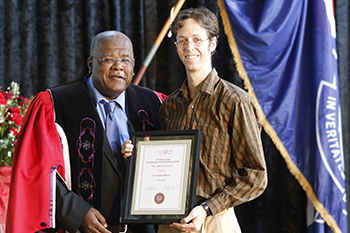Latest News Archive
Please select Category, Year, and then Month to display items
![]()
#UFSupdate (18 March 2020): UFS IMPLEMENTS MEASURES TO MINIMISE RISK OF COVID-19 TO STAFF
STATEMENT BY PROF FRANCIS PETERSEN, RECTOR AND VICE-CHANCELLOR
The executive management of the University of the Free State (UFS) welcomes the announcement of Dr Blade Nzimande, Minister of Higher Education, Science and Technology on 17 March 2020 that all post-school training institutions will have an early recess, starting on 18 March 2020. The Minister’s directive that universities should minimise risk of COVID-19 to all its staff during this time is also welcomed.
The announcement of Dr Nzimande is in line with the university’s decision on 16 March 2020 to suspend the academic programme as from 17 March 2020 and to resume it again on 14 April 2020.
It is important for us all to know that this is not business as usual, and that different thinking is required. Responsible citizenship is one of the crucial elements the world has increasingly been experiencing for the past few weeks. This is why we must act out our responsibility towards one another by focusing on ways in which social distancing can be achieved – especially during this low-risk period that South Africa is still experiencing. This is one of the reasons that informed the university’s decision on 16 March 2020 week to suspend the academic programme and also for students to vacate the residences by 20 March 2020.
The health and well-being of our staff members are equally important. The university’s Employee Task Team that was established on 16 March 2020 analysed options for the continuation of university operations during the recess period. These options were submitted to the executive management, discussed with the Chairperson of the UFS Council and approved on 18 March 2020.
Staff members who have children at school and pre-school may work from home on 19 and 20 March 2020. For the period 23 March 2020 to 13 April 2020, the number of staff members present on all three campuses will be reduced to a minimum and staff members may be allowed to work from home where practically possible.
Arrangements have been made to accommodate those staff members who are performing services which cannot be done from home (such as cleaning, gardening, maintenance, sports, etc) in a flexible and reasonable way. Similar arrangements will be made with office-based support services staff, prioritising institutional needs and based on humane and personal circumstances. Academic staff have been requested to ensure that the online learning materials are finalised and made available for the online learning platform.
The decision for employees to work from home is based on the premise that all employees are deemed to be at work from 23 March 2020 to 13 April 2020. This requires staff members to be available and contactable by line managers at all times during the university’s normal working hours.
I am comfortable that these measures will alleviate the concerns from our staff regarding the spreading of COVID-19 and the risk to themselves without compromising university operations.
Prof F W Petersen
Rector and Vice-Chancellor
University of the Free State
Book Prize for Distinguished Scholarship awarded to Dr Christian Williams
2016-03-24

Prof Jonathan Jansen, Vice-Chancellor and Rector of the University of the Free State and Dr Christian Williams, senior lecturer at the UFS Department of Anthropology.
Photo: Johan Roux |
When Dr Christian Williams moved from the United States to Namibia in January 2000 as part of the WorldTeach volunteer programme for teachers, he had not anticipated an award-winning piece of scholarship in his future. It was during these visits to Namibia, though, that the seeds for his highly-acclaimed book were sewn.
While volunteering at the St. Therese Secondary School in Tses at that time, Dr Williams – now a senior lecturer at the University of the Free State (UFS) Department of Anthropology – became acquainted with some of the school’s alumni. The stories these individuals started sharing with him soon revealed personal histories of exile and violence by fellow SWAPO (South West Africa People’s Organization) members.
These experiences ultimately resulted in Dr Williams’ book, National liberation in postcolonial southern Africa: a historical ethnography of SWAPO’s exile camps, published last year. Due to the book’s literary impact, the university awarded Dr Williams the UFS Book Prize for Distinguished Scholarship on Friday 19 February 2016. Dr Williams is the second academic to be awarded this prize.
Politics of the past
In the 1960s, Namibians mobilised and retaliated against colonial rule under the liberation movement known as SWAPO. This created political tension which resulted in the flight of many SWAPO members to exile camps administered by the party.
“Over its three decades in exile, SWAPO was responsible for the welfare of roughly 60 000 Namibians. This was about 4% of the total Namibian population at independence – most of whom lived in camps,” says Dr Williams. The research originally used as a basis for his doctoral thesis was subsequently developed into this prize-winning book.
Advancing the Human Project
“It’s an honour to receive recognition from the university; it means that they value the kind of work that I am doing. I think it’s great for universities to have such prizes,” Dr Williams says.
Supporting the UFS Human Project, Dr Williams will donate a portion of the R25 000 prize money towards the UFS Student Bursary Fund Campaign, as well as the school in Namibia.The rest will subsidise the purchase of the book for distribution to libraries and as gifts.